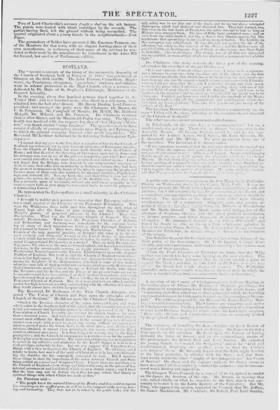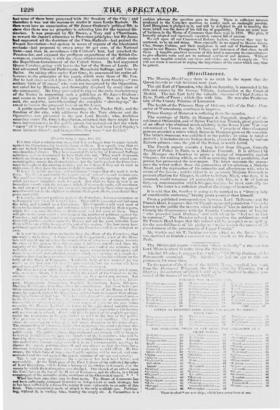The et-no:may of installing Sir Jant-•- Grab: t., as Lord
Rector of Glasgow University WO, pias'orined. out Erbiay. Sir Janie, delivered a long speech on the occasion. He dwelt upon the honour of haviag defeated the Duke of Sussex : and on tla; extraordinary merits of his predecessors. Sir Robert Peel and Lor 1 stanky. He exhorted his young friends to search the Seri p, uses,- and to be " hia�l tail tender-hearted. fisygiehn,g ono ar.,;thee. even- as (sod Cbrist.g. sake forgave" tine». Ile fervently h• yeah that the Kirk might flourish to the latest pisteritv, in alliance with the State : at.d that Scot- land would retain the other " trophy of her independence.- her Court of Session : O these and the cognate snb'iects sir James seems have descanted till be completely wearied his audience ; and he encoun- tered much hissing and opposith The C;!aAgow Town-Couucil. by a vote of 17 to 14. agreed to confer on Sir James the freedom of the city. Mr. Brown. in moving this vote, relied chiefly on what he stated to be the fact, that it was cus- tomary to bestow it on the Lords Rectors of the University. Bat Mr. Gray, who opposed the motion. reminded the Cinmeil. that Mr. Jeffrey, Sir dames Mackintosh, Mr. Cockburis Sir Robert Peel. Lord Stanley, bad none of them been presented withthe 'freedoM of the City r and' therefore it was not the enstom to &Infer it 'Opon'lleciedx Retort. ' He then went into an examination of if James Ortibani's' 'pelitieal life, to show that there was to propriety in selecting him for the -nnurnal dis- tinction. It was proposed by Mr. Broten, a Tory and a Chnrchmin, to reward Sir James's adherence to Protestant principles: but Sir James land supported all the doctrines of the Ultra-Radicals—bad praised the French Revolution—had spoken in terms of rapture of the tricoloured sockade—had proposed to sweep away 30 per cent, of the National Debt—and then in, accordance with Cohhett's hint, had attacked the Pension-list, and exposed the profligate expenditure of the British Go- vernment, contrasting it with the cheap administration of affairs under the Republican Coverrintent of the United States. He had supported Queen Caroline, going with her to the bar of the House of Lords. He bad advocated Triennial Parliaments, Household Suffrage, and Vote by Ballot. On taking office under Earl Grey, he announced his entire ad- herence to the principles of his youth, which were those of Mr. Fox. But he had since seceded from the Liberals, with Lord Stanley—" two solitary birds of ill omen," who were not recognized by the Opposition, not cared for by Ministers, and thoroughly despised by every class of the community. Mr. Gray proceeded to expose the gross inconsistency of the Tories in supporting such a politician as Sir James Graham ; and seems to have galled this party exceedingly. But, as has been .said, the majority, notwithstanding the complete " showing-up," de- creed to bestow the proposed hunger on Sir Joines.
A public meeting was held on Saturday, in the Trades Hall ; and the freedom of the city, with addresses from the 'Cory citizens and the Operatives, was presented to the new Lord Rector ; who, doubtless smarting under Mr. Gray's flagellation, admitted that there might have been inconsistencies in his pubic career, but maintained that the whole "tenor" of it was Conservative. In office, he had been Lord Stanley's most intimate friend ; and in opposition they were " not divided."



























 Previous page
Previous page